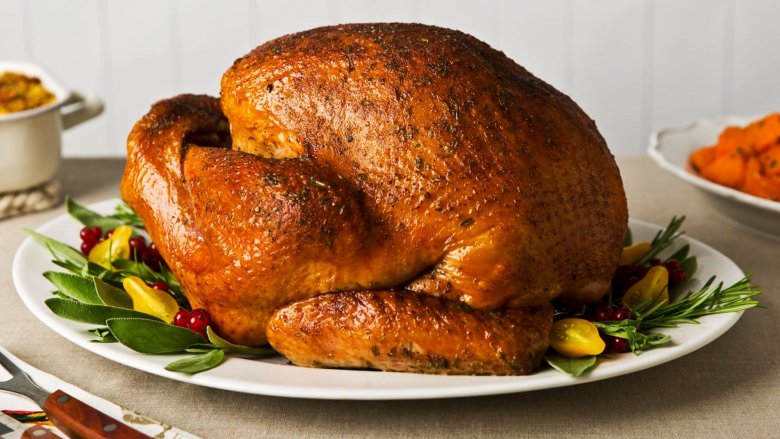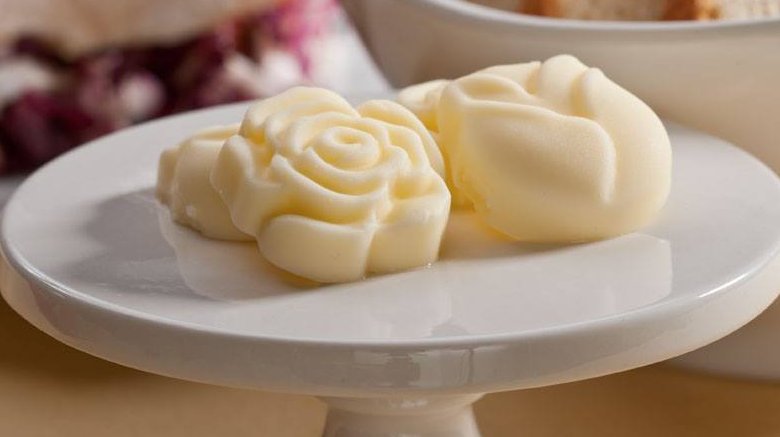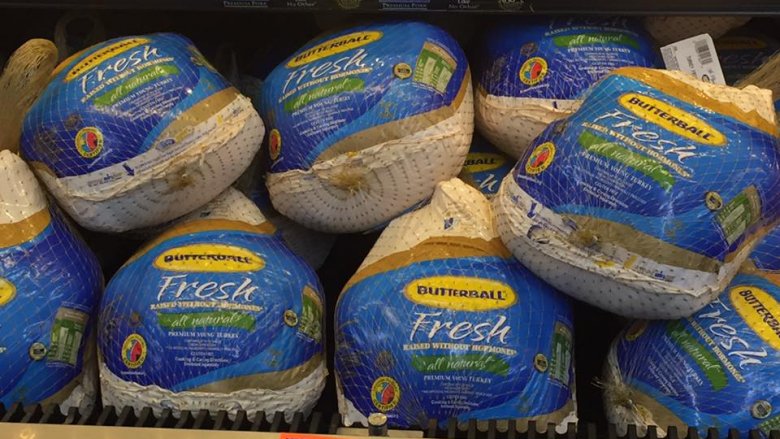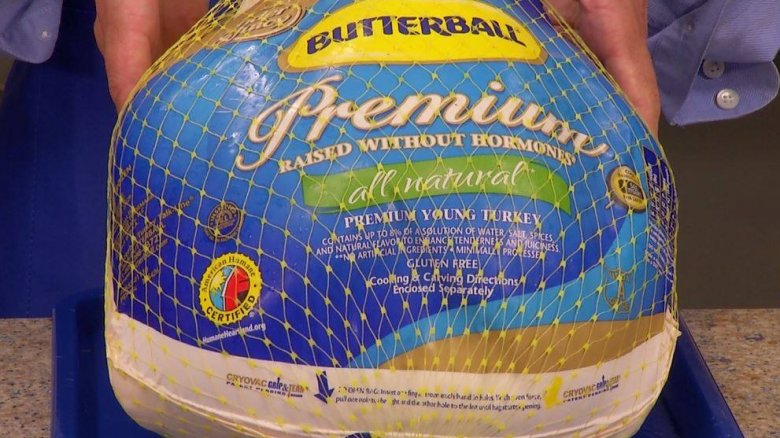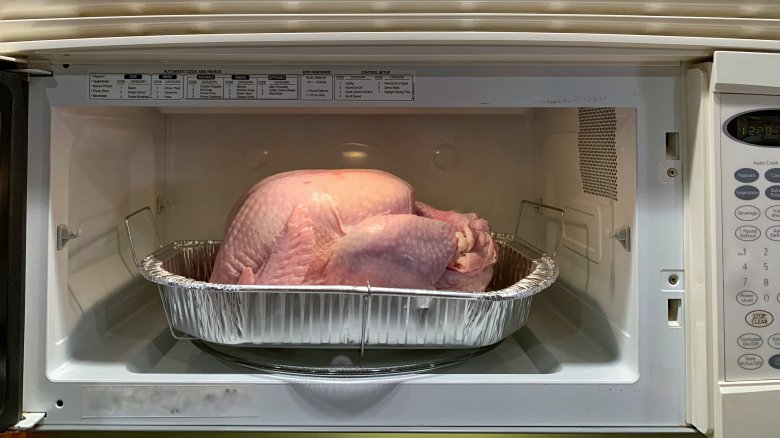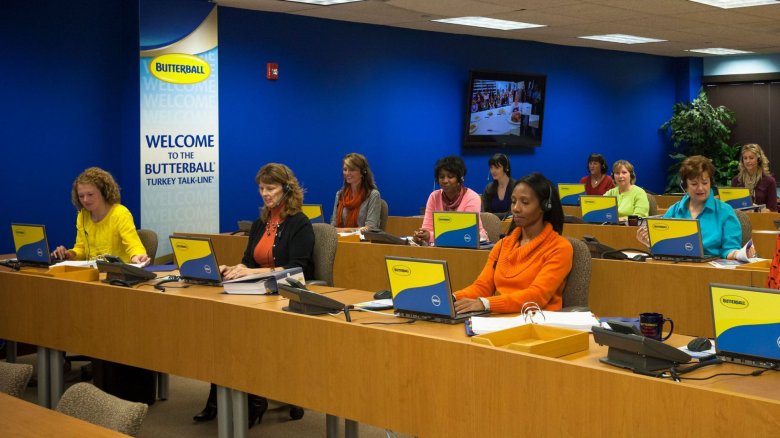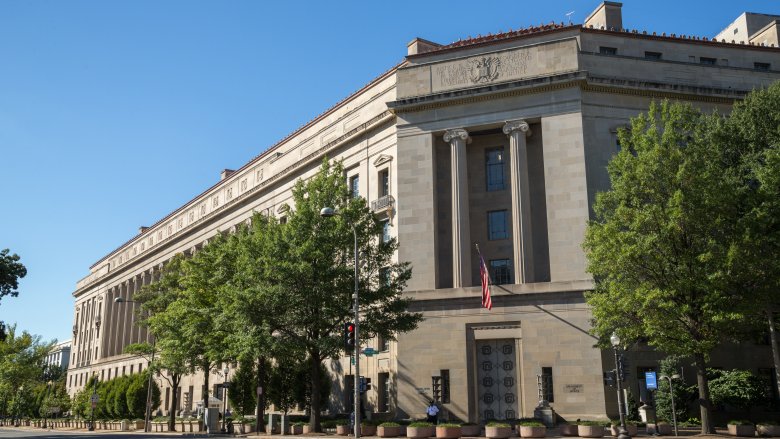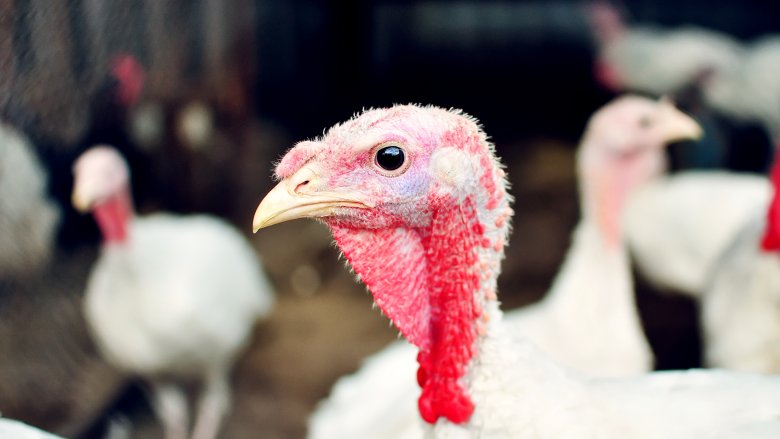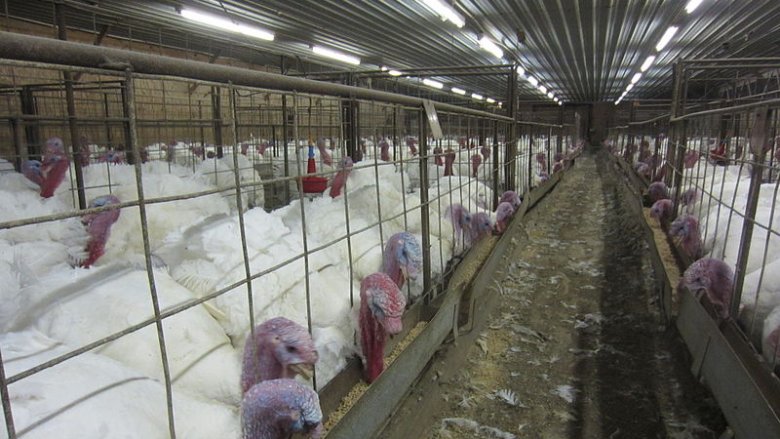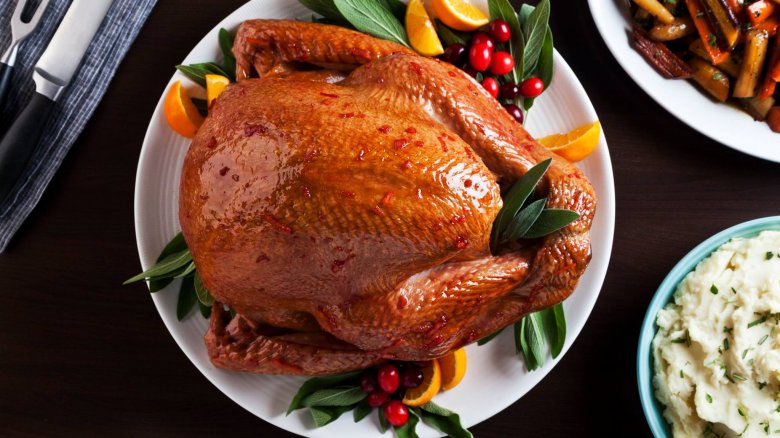The Untold Truth Of Butterball
In operation for over half a century, Butterball might be considered an American institution. While whole turkeys might have been its original bread and butter (pun intended), today it offers a vast array of very popular turkey products, from turkey meatballs and turkey bacon, to turkey sausage and cold cuts. The Butterball name has become a lunch and holiday staple. According to its website, it's the largest producer of turkey products in the country. Every year it raises more than 40 million turkeys. That's a LOT of poultry. It's estimated that over 100,000 questions are posed to the operators at 1-800-BUTTERBALL, its infamous "Turkey Talk-Line," each year during November and December.
Proud turkey lovers, Butterball seems to relish its fame in the poultry world. But there are some underground facts about the brand that even the most loyal turkey enthusiasts might not know. Get ready to gobble some serious Butterball intel (okay, that's the last of the the puns, we promise). This is the untold truth of Butterball.
"Butterball" and "Butterball Farms" are two separate companies that started as one
The name Butterball was first trademarked in 1940 by a deli owner named Ada Walker in Wyoming, Ohio. Then Leo Peters of Grand Rapids, Michigan bought the "Butterball" trademark from her in 1951. Despite clearly seeing potential in the name "Butterball," Peters wasn't a poultry man himself. So he leased the name "Butterball" to Swift and Co., a Chicago company that sold turkeys, before ultimately selling it to them in the 1960s. In the sale Peters still retained some non-poultry-related rights to the name Butterball, and thus created Butterball Farms, a separate company that has nothing to do with turkeys. In fact, it makes actual butter (sometimes even butter balls).
Peters developed over 60 patents in his lifetime, one of which was a squeeze bag that makes margarine look like the color of butter. Leo Peters' home in East Grand Rapids was referred to as the "Butterball Mansion" — but again, it's the not the home of soon-to-be Thanksgivings dinners, like you might imagine.
Since Swift and Co., the turkey-making version of Butterball, has gone through a number of corporate buyouts. Swift was acquired by ConAgra in 1990. Then Carolina Turkeys snapped up the Butterball division from ConAgra in 2006, and officially created Butterball, LLC. In 2010, Seaboard & Goldsboro went halfsies on Butterball, LLC, taking 50 percent ownership of the company. While Butterball is based in North Carolina today, it all started with a woman in Ohio who had a stellar idea for selling sandwiches.
Butterball turkeys are pre-basted
Butterball is known for its pre-basted turkeys. The frozen Butterball turkeys have an eight percent solution of water, salt, spices and "natural flavors," while the turkeys it sells as fresh (which, by law, mean they've never been chilled below 26 degrees Fahrenheit) only contain four percent of that solution.
The basting is essentially part of the processing that happens before the turkeys hit the grocery store shelves. It's a crucial step for the frozen turkeys in particular, and also why there is higher concentration of the solution in the frozen birds. Freezing a turkey changes the meat's cell structure, which causes a gradual loss of moisture as the turkey defrosts. The result can be a dry, tough bird — something all that basting is trying to counteract.
However, a lot of fresh turkeys you'll see for sale at your local grocery store aren't pre-basted, and that's where Butterball gets very different. There's not necessarily anything wrong with a fresh one that's been pre-brined — it may even be more tender than a non-brined bird — but it might be a lot saltier than you expect. This is especially likely if you don't realize it's been basted, and then baste it yourself. That'll be one salty turkey!
Their labels probably don't mean what you think
Butterball takes advantages of a few labeling tricks to make us feel good about choosing their birds for our turkey dinners. We feel like we're doing the right thing if we buy a bird that's labeled "premium" or "no hormones added." But these catchy sales terms don't mean what you think — and some of them don't mean anything at all.
The USDA doesn't even have a "premium" category for poultry. Premium is just a fancy adjective that has no real significance. And while you may think Butterball is morally superior for raising a bird without hormones, you shouldn't. The law already prohibits poultry producers from giving birds growth hormones. Don't be deceived by the phrase "all natural" either. You might envision turkeys happily roaming in a pasture eating plant based organic turkey food but the US Department of Agriculture simply deems that a product is "all natural" if it doesn't have any artificial ingredients. It says nothing about how the poultry was raised (there's a good chance it was in a cage and under the influence of antibiotics).
Butterball also uses the word "young" on its label. This is a distinction because the USDA insists that manufacturers label the bird as "mature" or "yearling" if they have been alive longer than one year at the time of slaughter, but this isn't as big of a deal as you think. While there is a difference between the bird labels, the turkey isn't really superior because it was killed in its youthful prime. The majority of turkeys being raised solely for commercial consumption are killed when they're "young" (around 16 to 18 weeks old).
They say you CAN cook a turkey in the microwave
In November of 2018, there was an underground millennial-driven prank known as the turkey challenge where young adults were encouraged to text their parents asking how to cook a 25 pound bird in the microwave. The teens and young adults were sharing screenshots of the text exchanges of parents' shocked responses on their social media with the hashtags #turkeychallenge and #25LBturkeychallenge. As you can imagine, parent shaming and hilarity ensued.
But Butterball surprised all the pranksters when it chimed in on Twitter — and not in the way you might expect. The turkey experts proclaimed it is, in fact, possible to cook a turkey in the microwave, then it supplied the TODAY show a full play-by-play on how to do it. The only caveat is that the turkey has to be no bigger than 12 pounds — if it's much bigger than that, after all, it's probably not going to fit in your small appliance. You also have to thaw it first and cook it on high for four minutes per pound, followed by a series of flipping and basting actions that sound rather tiring. The viral prank really proved that Butterball seems to have its nuked turkey game on lock.
The Turkey Talk-Line has some major qualifications
Nothing says "I have arrived" in the poultry industry quite like a degree from Butterball University. Butterball started its Turkey Talk-Line in 1981. The ultimate resource for novice turkey cookers at Thanksgiving time, in 2016 it even created the option for clueless turkey chefs to text or tweet their questions, which range from how long should you cook a turkey to, can you cut a turkey with a chainsaw — for real.
The 50 or so peeps who make up the Turkey Talk-Line crew range in background from professional chefs to food stylists. But their attendance at Butterball University each year for the first three years they man the phone lines is required, regardless of any prior expertise. Butterball University is basically a very intense, three-day course that guides turkey talk liners on how to answer the vast array of questions that come down the pipe each November and December. The core classes include thawing, cooking, basting, resting, moving and carving. Bottom line: if you can't pass Turkey 101 at BU, you aren't getting a coveted seat at the Turkey Talk-Line table this Thanksgiving.
Men joined the Turkey Talk-Line in 2013
Perhaps it was an oversight and not an over generalized stereotype that men are not as skilled in the kitchen as women, but Butterball didn't have any men fielding questions on the Turkey Talk-Line until 2013. The first man on the line was RJ Jaramillo, the brains behind the blog, Cook Like A Dad. Apparently, Butterball only realized its bias when statistics revealed one in four of the calls to the Talk-Line were from men. Consumerist reports that Butterball's CEO in 2013, Ron Brenneman, told the Associated Press, "We stepped back and looked at the changing Thanksgiving table and men are becoming more and more a part of, not only the carving of the turkey, but the cooking of the turkey."
Butterball started letting folks email the Turkey Talk-Line in 2006, then upgraded to allowing chats via its website in 2012. It's a little surprising that Butterball evolved with the times quicker with its technology upgrades than it did with the gender of its turkey specialists, but we're glad they finally caught up.
Their parent company has been accused of working with terrorists
Butterball might be an all-American brand but that hasn't saved it from some not so patriotic rumors. In 2016, Butterball's parent company (well, half of it), Seaboard Corporation, caught the eye of the U.S. Department of Justice when word got out that they were allegedly doing business with a Lebanese family that had been put on the blacklist for terrorism affiliation. Members of the Tajideen family supposedly gave hefty contributions to Hezbollah, a Shiite militant group associated with some terrorist attacks on US soil in the 1980s and military support to the Syrian regime of Bashar al-Assad.
The nitty gritty of the dealings traces to a wheat-flour transaction between Seaboard and the Lebanese businessmen/brothers, who were placed on the terrorist watch list in 2009 and 2010. Seaboard denies knowingly working with terrorists but did acknowledge the operation of a flour plant in Gambia with a man named Mohamed Bazzi, who had business dealings with the blacklisted brothers. Bazzi claimed he stopped working with the men when he learned they were on the terror watch list but neither he nor Seaboard can ever reverse the Google stain of Butterball's potential terrorist collaboration.
One of Butterball's biggest source of laborers now face potential deportation
Butterball maintains the largest turkey processing plant in the world in the small town of Mount Olive, North Carolina. The bulk of its employees are from the estimated 59,000 Haitians working in the U.S.under the protection of a Temporary Status Program (TPS), which was created for refugees of the 2010 Haiti earthquake. In January of 2018, President Trump threatened the TPS of this unique immigrant population, arguing it was only intended to be temporary. As a result, these workers and other Haitians in different areas could be deported, and that would be devastating not just for the immigrants, but for Butterball, and for the town.
Like many immigrants, the Haitian Butterball workers send a lot of their earnings back to Haiti to help their struggling families. They also perform labor locals were unwilling to do, like handling animal carcasses and feces. These Haitians have been a major force in the revival of Mount Olive. The town manager, Charles Brown, told The Washington Post, "If the Haitians and other immigrants suddenly went away, not just in Mount Olive but in eastern North Carolina, agriculture would suffer an amazingly hard blow." Since the Butterball plant in Mount Olive processes over 500 million pounds of turkey each year, the loss of so much of its workforce could cause a severe impact.
The attempts to deport this particular immigrant group have temporarily been blocked by a federal court challenge. As a result, The Department of Homeland Security has stated that the existing permits will not expire until 2020 or 2021, which is an extension from the original July 22, 2019 deadline.
When Butterball announced you could ask Alexa how to cook turkey, PETA responded with a roast of their own
In November of 2018, Butterball announced it had teamed up with Amazon to create some pre-recorded answers for Alexa to dole out when folks ask their Amazon Echo about cooking turkey. They decided on what info to include based on the most FAQs the Turkey Talk-Line receives each year.
Then PETA clapped back. Not necessarily known for its sketch writing abilities, PETA definitely got creative on this animal cruelty call-out by releasing a parody video that essentially shamed Butterball for unethical turkey treatment. The PETA roast video is pretty tough to watch. It depicts a woman and her daughter preparing a Thanksgiving turkey. They start asking Alexa questions about turkeys and the answers are uncomfortably honest.
Spoiler alert: there is footage from a turkey slaughterhouse, a voice from an imaginary turkey crying for help, and a box of dismembered turkey parts. By the end you've gotten the message, turkey raising and selling isn't as whimsical as Butterball might try to make it sound, even through the pleasant-sounding filter of an AI household device.
It's been busted for animal cruelty
PETA's accusations weren't completely unfounded.
In 2011, someone from the animal rights group Mercy for Animals went undercover to work at a Butterball factory in North Carolina. After installing a hidden camera, the MFA rep acquired unsightly footage of repeated turkey abuse. When the worker submitted his findings to the Hoke County District Attorney's office, they ordered local officials to conduct a raid of the facility. The workers had been videotaped kicking the turkeys, stomping on them, and dragging them by their neck or their wings. Footage also revealed turkeys with "open wounds and exposed flesh." The following year in August, the first of six workers charged pled guilty to animal cruelty.
A veterinarian from the North Carolina Department of Agriculture also got into trouble for tipping off a Butterball veterinarian about the existence of the footage. Dr. Sarah Mason pled guilty to "obstructing justice and obstruction a public officer." Dr. Mason maintained that she was a longtime friend of the Butterball vet and that her intention was to stop the animal abuse as soon as possible.
MFA also went undercover in 2012 and 2014 and claims Butterball workers continued to engage in gruesome treatment toward the turkeys (and even shared the footage on YouTube), despite the legal ramifications of the 2011 raid. Butterball maintains it was unaware of the cruelty until the footage surfaced (in all three undercover investigations by MFA) but insists it has a zero tolerance policy for mistreatment of its birds.
No, there isn't actual butter in Butterball turkeys
It's okay if you've asked yourself if Butterball turkeys actually contain butter. It makes sense, because the word butter is in the name after all. And generally speaking, butter makes everything taste better. Why wouldn't that be the case with mass produced poultry?
But alas, Consumerist reports that the former CEO of Butterball, Rod Brenneman, confirmed in a 2013 interview with the Associated Press that the Butterball-branded birds are not made with butter. Brenneman said, "Many people think Butterball turkeys have butter in them, but they don't. Basically the name came about because of their plump size and golden color. We're proud of the Butterball name. There is no talk or joke about being a butterball at this company. Only about our turkeys. They're plump."
Of course, as we've previously stated, the Butterball name is traced back to a farmer in Ohio and Brenneman likely can't confirm that plumpness or a golden hue were the reasons behind her amazing name — though it does make perfect sense. It could have just been the nickname for her favorite turkey.
